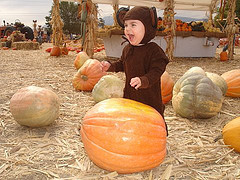As Halloween excitement mounts in our household and the nip of fall is finally forcing us to find our jackets (I know, it is good to be a Californian), one thing is clear: The holidays are right around the corner.
I'm the first to feel annoyed when I see Hallmark Thanksgiving and Christmas stuff in store windows the day after Halloween. But I find the holidays far less stressful if I give them plenty of time and space, both for planning and for enjoying. So forgive me: I'm starting to think about my New Year's resolutions now.

The holidays are not always the happy time they can be for many people, particularly adults who are disappointed or hurt year after year—that their family isn't what they want it to be, that they got stuck with all the gift-buying and holiday tasks, that they always do for everyone, everywhere, and no one seems particularly grateful.
Which makes the holidays a fruitful time to think about forgiveness. If we want to feel happy over the holidays, we need to let go of grudges from last year and prevent those same old transgressions from happening again—and in many (often very difficult) cases, anticipate the times we'll be expected to hold hands with family members who have hurt us.
My point: This holiday season will be a lot happier if we aren't angry and resentful. And our kids will have more meaningful holidays if they learn to practice gratitude and forgiveness rather than anger and entitlement. I've blogged before about how forgiveness is something we do for ourselves, to lead happier lives. I wrote then:
Few people fully realize the huge impact the ability to forgive can have on their happiness, nor do most people think of this as a skill that they need to teach and practice with their children. But important it is: forgiving people tend to be happier, healthier, and more empathetic. Read the rest of this posting on forgiveness.
Teaching Children Skills for Forgiveness
So the holidays are a particularly apt time for us to teach kids the skills they need to become forgiving people. We teach forgiveness when we forgive others because our children learn what we model; we can also teach our children directly how to forgive.
Fred Luskin, the director of the Stanford Forgiveness Project, has spent decades researching and teaching about forgiveness. Luskin emphasizes that forgiveness is not about forgetting, as the adage would have us believe, but about letting go. It is about choosing positive emotions over negative ones; it is a decision that results in an entirely different emotional experience.
Luskin has developed a program to help people learn to forgive even the most heinous acts. I've translated his forgiveness program here into skills and concepts we can teach and practice with our kids.
- A good first step is to help kids develop the ability to understand their emotions and articulate them when something is bothering them. Practice this by asking kids to identify and talk about their feelings, particularly when they are hurting. Kids can learn to talk about their feelings at a very young age.
- When kids are upset, help them practice mindfulness. This will help turn off their fight or flight response so that they can respond to the upsetting situation more effectively.
- Another important way to teach forgiveness is simply to talk with kids about how awful we feel when we ruminate about how we've been hurt, and remind them of all the positive benefits for ourselves of forgiveness. When kids feel hurt, help them recognize that what they are feeling is distress coming from what they are thinking and feeling right now, not from the original offense, whether it was months or just minutes ago.
- Teach kids that we suffer when we demand things that other life is not going to give them. They can hope for things, of course, and they can work hard to get what they want. But they cannot force things to happen that are outside of their control. When we expect something outside of our control to happen and then it doesn't, we feel hurt and wronged. Help kids practice letting go of desire for things they have no influence over, and redirect their energy towards things they do have control over.
- Talk with your kids about the desire for revenge, and show them that the best revenge is a life well-lived. Explain that when we focus on how we've been hurt, we give power to the person who hurt us because it causes us to continue hurting.
Forgiving is tough business. It takes courage and resolve to let go of negative feelings when we've been wronged. Fortunately this gets easier with practice—especially if we start with the small stuff and get in the habit early on—and it makes us stronger and better people.
Josh Ruxin is also blogging about forgiveness on The Huffington Post.
© 2009 Christine Carter, Ph.D.
Selected references:
Luskin, Frederic "The Choice to Forgive" Greater Good, 2004, 13-15.
———Forgive for Good. New York: Harper Collins, 2003.
Join the Campaign for 100,000 Happier Parents by signing this simple pledge.Become a fan of Raising Happiness on Facebook.
Follow Christine Carter on Twitter.
Subscribe to the Happiness Matters Podcast on iTunes.


Comments
As Halloween excitement mounts in our household and the nip of fall is finally forcing us to find our jackets (I know, it is good to be a Californian)
In San Diego our lovingly carved pumpkin melted in a day and a half of 70-80 degree weather. Halloween is more fun elsewhere. (I understand Berkeley is not as hot.)
Allen K. | 2:52 pm, October 29, 2009 | Link
Those are really good tips. I think most adults could benefits from those lessons just as well as kids. I, for one, am guilty of holding a grudge and spending valuable time stewing over being wronged. I think other people must have their won issues to deal with. But, you’re right, to get kids to be mindful of these impulses early is important. Thanks.
Keith Wilcox | 7:41 pm, October 29, 2009 | Link
Love this one!!! Learning to forgive, whether it be yourself or other people, is a pretty tough thing to learn – like being able to say you’re sorry. I can recognize how much better I feel when I forgive than carry anger and resentment around. Trying to pass that one along to my little people!
A.M. | 3:52 pm, October 30, 2009 | Link
I just came across your website, absolutely amazing! I’m putting together a gratitude resource sheet for my moms’ group (over 900 families) and have collected the names of some books that may be a nice addition to your website under the Teaching Gratitude section:
Lots of Thanks board book by Thierry Courtin
Hello Kitty: A Day of Thanks by Higashi Glaser
The Most Thankful Thing by Lisa Mccourt and Cyd Moore
Strawberry Shortcake: Berry Thankful! by Megan E. Bryant
Feeling Thankful by Shelley Rotner
Let’s Be Thankful by Hallinan, P.K., and P.K. Hallinan
Little Critter: Just So Thankful by Mercer Mayer
Thanksgiving Is for Giving Thanks by Margaret Sutherland and Sonja Lamut
The Thank You Book for Kids: Hundreds of Creative, Cool, and Clever Ways to Say Thank You! by Ali L. Spizman
Also, the link on your website for the book: Thanks!: How the New Science of Gratitude Can Make You Happier isn’t correct, it took me to another book about EQ. Hope that’s helpful.
You have made my day – thanks for being a wonderful new resource for our family,
R.A.M. | 3:56 pm, October 30, 2009 | Link
I really like this…makes me think about other things we might have said to E when the stuff got stolen.
J.L.J. | 7:31 pm, November 11, 2009 | Link
The rubber meets the road when we ask ourselves how did I treat others and have I asked for their forgiveness. Have I made a proper apology without qualification and have I done so with the thought of how I would change my behavior in the future. That is what is called making an amends.
M.W. | 7:33 pm, November 11, 2009 | Link